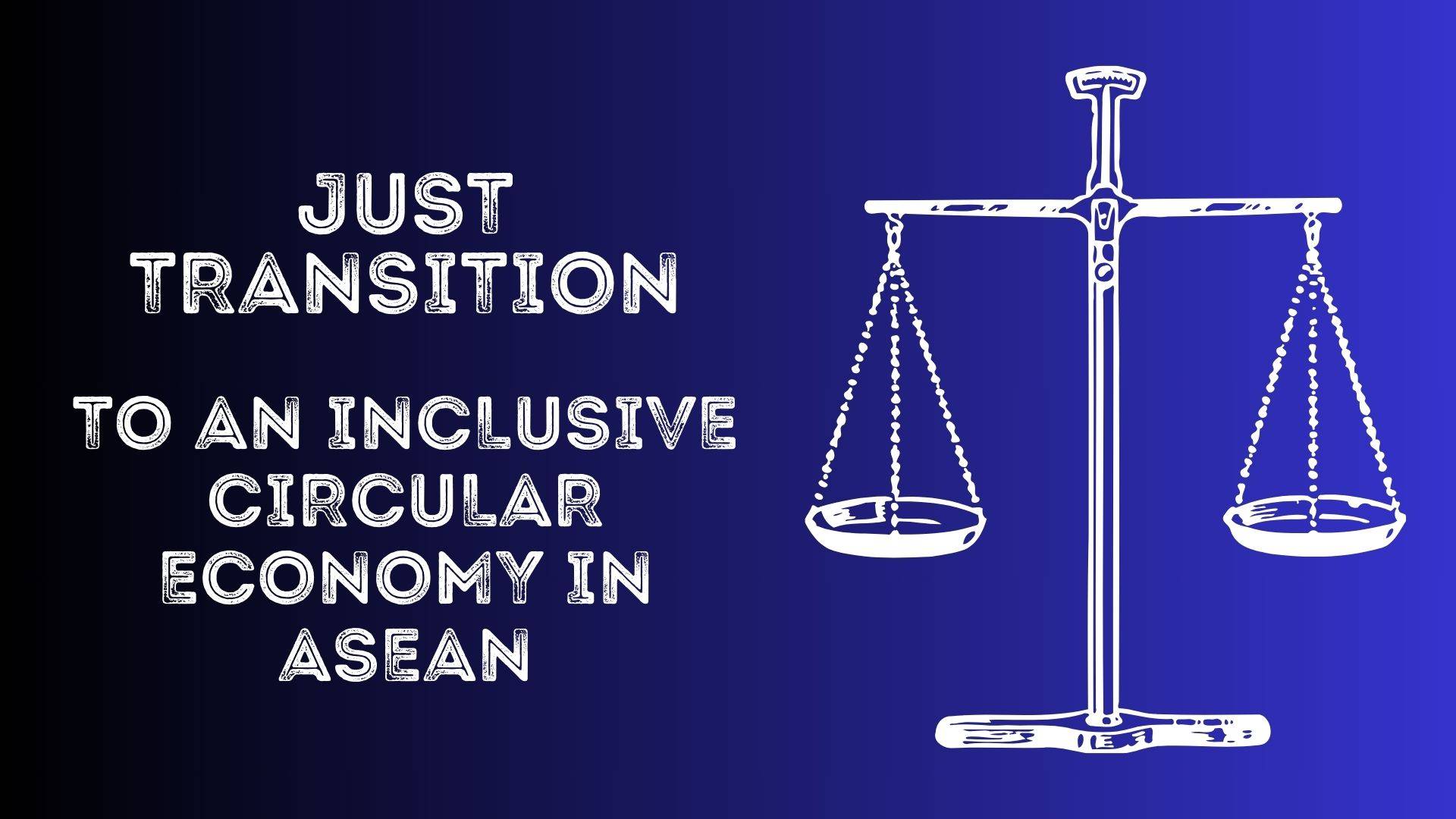
Background
ASEAN is growing rapidly due to its resources, demographics, and strategic policies. The Circular Economy aims to sustain this growth while reducing environmental impact. However, the shift from a linear economy affects vulnerable communities most, who suffer from unsustainable practices and climate events. A 'Just Transition,' a concept originating in the 1970s for labour protection in the context of energy transition, now focuses on inclusive climate action, ensuring fair and sustainable job creation. This concept is vital for the Circular Economy, ensuring resource efficiency and fair distribution of benefits and impacts. For a Just Circular Transition, inclusive strategies and multi-stakeholder participation are necessary to support the Sustainable Development Goals (SDGs), addressing health, poverty, and equality.
 Key Takeaways
Key Takeaways
These key takeaways from the webinar offer a comprehensive overview of the challenges and way forward to a Just Circular Transition:
- Circular Economy and Just Transition: Promotes sustainable job creation and reduces global emissions, emphasizing social equity.
- Justice Principles: Distributive, Procedural, and Recognition of Rights are crucial for fair resource distribution and inclusive decision-making.
- ASEAN’s Critical Sectors: Tailored approaches needed in mining, electronics, textiles, and waste management to mitigate social impacts.
- Challenges for Informal Workers: Inclusive policies balancing formalization to integrate informal waste workers into circular economies.
- Effective Policy Tools: Regulations, taxation, and incentives pivotal for fostering circular economies and addressing challenges.
- Importance of Social Dialogues: Inclusive policymaking ensures equitable outcomes and addresses community concerns.
- Inclusive Urban Economies: Circular practices in urban sectors like waste management critical for sustainable development.
- Collective Action: Collaboration among unions, cooperatives, and associations essential for inclusive and sustainable transitions.
- Gender Equality: Integrating gender perspectives enhances social and economic outcomes in circular economy initiatives.
- Rights of Indigenous Peoples: Recognition and protection of indigenous rights crucial for equitable development in circular economy strategies.
- Local Initiatives: Supporting local projects illustrates the potential of grassroots efforts in achieving global sustainability goals.
- Upholding Justice Principles: Distributive fairness, procedural transparency, and rights recognition ensure just and inclusive transitions.
- Sector-Specific Solutions: Tailoring strategies for sectors like waste management acknowledges unique challenges in circular transitions.
- Policy Interventions: Addressing inequalities and supporting marginalized communities essential for inclusive circular economy initiatives.
- Long-Term Planning: Sustained commitment and comprehensive planning needed to address complex social, economic, and environmental challenges in circular transitions.
Introduction
ASEAN is one of the most dynamic and fastest-growing regions in the world, thanks to its rich natural resources, diverse demographics, infrastructure development, strategic location, economic integration, and policies that encourage trade and investment. In recent years, the Circular Economy has gained momentum as a means to dissociate this rapid growth from resource depletion and environmental degradation. However, the significant impacts of transitioning from a linear to a circular economy are severely felt by underserved communities and countries, which are most affected by unsustainable business practices, extreme climate events, and the implementation of reformative policies.
The concept of a 'Just Transition' originated in the 1970s as a labour protection strategy and has regained popularity over the last decade as a framework for social inclusion while achieving climate goals. The United Nations defines it as "ensuring that no one is left behind in the transition to low-carbon and environmentally sustainable economies and societies."[1] Furthermore, the International Labour Organization (ILO) expands this definition beyond climate goals to include "greening the economy in a way that is as fair and inclusive as possible to everyone concerned, creating decent work opportunities and leaving no one behind," with an emphasis on creating decent jobs.[2]
Discussing a Just Transition in the context of a Circular Economy is crucial, encompassing strategies such as maximizing resource circulation, enhancing resource efficiency, and transitioning to more sustainable resource options. This is because the shift towards circularity will also affect how rights and welfare are distributed among regions, countries, organisations, societies, and communities. Often discussed solely as an environmental protection strategy, the Circular Economy requires additional efforts for a truly Just Circular Transition. Without the participation of multiple stakeholders, a sustainable circular roadmap cannot be achieved.
An Inclusive and equitable transition is essential for making the Circular Economy work for human development and thereby supporting the achievement of the Sustainable Development Goals (SDGs), including good health and well-being, no poverty and hunger, decent work, and equality. Various aspects of the Circular Economy, such as waste management, significantly affect the poorest communities, whether through improper management, which leads to environmental and health impacts due to landfill pollution, or through more formalised management, which can strip the informal sector of garbage collectors of their livelihoods and income from selling recyclables.
Low and middle-income countries, which heavily rely on resource extraction and pollution-intensive industries for a significant portion of their GDPs, will face challenges and will need supportive mechanisms and strategies to ensure a smooth transition to more diverse and sustainable economic activities without leaving anyone behind from the resource-intensive sectors. Multilateral trade agreements and international collaborations can help improve fairness in global trade and reduce inequality among countries during the transition. Therefore, discussing the Circular Economy on a global scale is imperative to ensure a Just Circular Transition.
The 1.5-hour webinar "Just Transition to an Inclusive Circular Economy in ASEAN" hosted by the ASEAN Circular Economy Stakeholder Platform (ACESP) and co-hosted by the EU SWITCH-Asia Policy Support Component, illustrated the importance of a Just Transition to the long-term positive outcome of Circular Economy.
The event began with Anthony Pramualratana, Deputy Director at the ASEAN Circular Economy Stakeholder Platform, who presented a background on a Just Transition of its definition, its needs and required components.
Social rights practitioners came together to discuss what a Just Transition means for Circular Economy, what are the challenges and how are things being done in the global and regional scale, and shared practical solutions at country level.
This expert discussion culminated in four key questions that need addressing:
- How can circular economy initiatives ensure that job creation and emissions reduction efforts prioritize equitable outcomes, particularly for marginalized communities?
- What strategies are necessary to integrate distributive justice, procedural fairness, and recognition of rights into the decision-making processes of circular economy transitions?
- How should policies be designed to formally recognize and support informal workers in circular economy sectors, ensuring their inclusion and fair treatment?
- What long-term planning and policy interventions are essential to address social, economic, and environmental challenges while promoting inclusive development through circular economy initiatives?
Towards a Just Circular Transition: What is a just circular transition and what will it take to realise it?

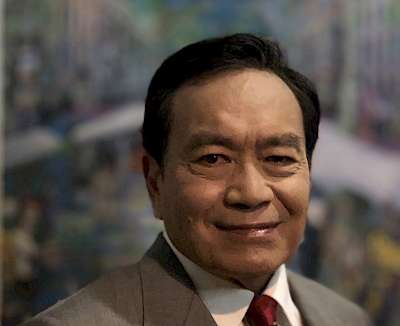 In this session, Anthony Pramualratana provided an overview of the linkages between the Circular Economy and people, highlighting the need for a Just Transition for a sustainable Circular Economy. The Ellen MacArthur Foundation found that adopting circular strategies in just four key material sectors—steel, cement, plastics, and aluminium—could lower global emissions from these key industry materials by as much as 40 percent by 2050. Furthermore, the International Labour Organization (ILO) estimated that circular economy jobs in waste management and recycling, sharing economy models such as repairing and renting, and the service sector will add 6 million jobs globally by 2030. This clearly shows that Circular Economy and sustainability are inseparable.
In this session, Anthony Pramualratana provided an overview of the linkages between the Circular Economy and people, highlighting the need for a Just Transition for a sustainable Circular Economy. The Ellen MacArthur Foundation found that adopting circular strategies in just four key material sectors—steel, cement, plastics, and aluminium—could lower global emissions from these key industry materials by as much as 40 percent by 2050. Furthermore, the International Labour Organization (ILO) estimated that circular economy jobs in waste management and recycling, sharing economy models such as repairing and renting, and the service sector will add 6 million jobs globally by 2030. This clearly shows that Circular Economy and sustainability are inseparable.
A Just Transition—Justice—can be categorized into three types: Distributive Justice, Procedural Justice, and Recognition of Rights. Distributive justice refers to the fair and equitable distribution of resources, opportunities, risks, and burdens among all stakeholders in society. Procedural justice pertains to a fair policy process and how legal authorities inclusively interact with all public stakeholders through participation and giving them a voice in decision-making. Recognition of rights involves recognizing and protecting the rights of all, especially marginalized or underserved communities, ensuring they are not forgotten and are integrated into transition narratives.
There are three critical sectors in ASEAN—mining and electronics, textiles and garments, and waste management—that will be significantly transformed during the transition from dirty practices to a circular economy. These sectors especially need a Just Transition to ensure a seamless process that leaves no one behind. Waste management is informal in many ASEAN countries. As waste management becomes more formal in a circular economy, informal waste pickers may be marginalized. This could result in fewer single-use plastics but a prosperous recycling industry. Therefore, employment opportunities in waste management and recycling should increase, offering opportunities to bring informal waste pickers into more upgraded roles within the formal sector.
Many ASEAN countries are mining producers, and the Circular Economy calls for recycling, reusing, and ultimately less mining. On the other end of the spectrum, Myanmar and Thailand are among the largest producers of heavy rare earth elements (REEs), which are essential for green energy, low carbon technologies, and batteries as we move towards a circular economy. The Circular Economy for electronics means items should last longer, with more reuse, repair, and reengineering, thus reducing consumerism and production. This creates new opportunities in the sharing economy for recycling, repair, rental, and sharing services.
Textiles and garments are important employers, especially for women, in many ASEAN countries. Cambodia’s economy is largely reliant on its garment industry, which caters to 200 international brands and represents 80% of its export value. Ninety percent of these garment workers are women. Vietnam’s textile industry employs more than 2 million workers, with textile and clothing exports comprising 15% of its GDP. Other important textile and garment countries in the region include Thailand and Indonesia. The Circular Economy in these sectors calls for the eco-design of clothes, fabrics, and processes to ensure recyclability and the use of eco-friendly materials and techniques.
A combination of policy tools, including regulation, taxation, training, and incentives, is considered to be the main instruments for fostering a circular economy. For example, Indonesia reduced its fuel subsidies and transferred them to Bantuan Langsung Tunai (BLT) Cash Transfer for the most vulnerable communities in 2015-2016. The EU also established the Just Energy Transition Fund, worth €5 billion, to address societal, socio-economic, and environmental impacts on workers and communities adversely affected by the transition away from coal and carbon dependence. Indonesia and Cambodia have accessed this Just Energy Transition Fund through the United Nations (UN), and many more countries are expected to follow.
Panel Discussion: Global Perspectives and International Approaches to a Just Circular Transition
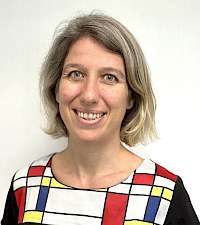 Elodie Maria-Sube moderated the session on international perspectives and practices of a Just Transition, starting with how the term was mainly applied to climate and energy transitions in the United States during the 90s. However, the term is now widely used for other environmental challenges, especially regarding the circular economy and handling the transition with justice within society.
Elodie Maria-Sube moderated the session on international perspectives and practices of a Just Transition, starting with how the term was mainly applied to climate and energy transitions in the United States during the 90s. However, the term is now widely used for other environmental challenges, especially regarding the circular economy and handling the transition with justice within society.
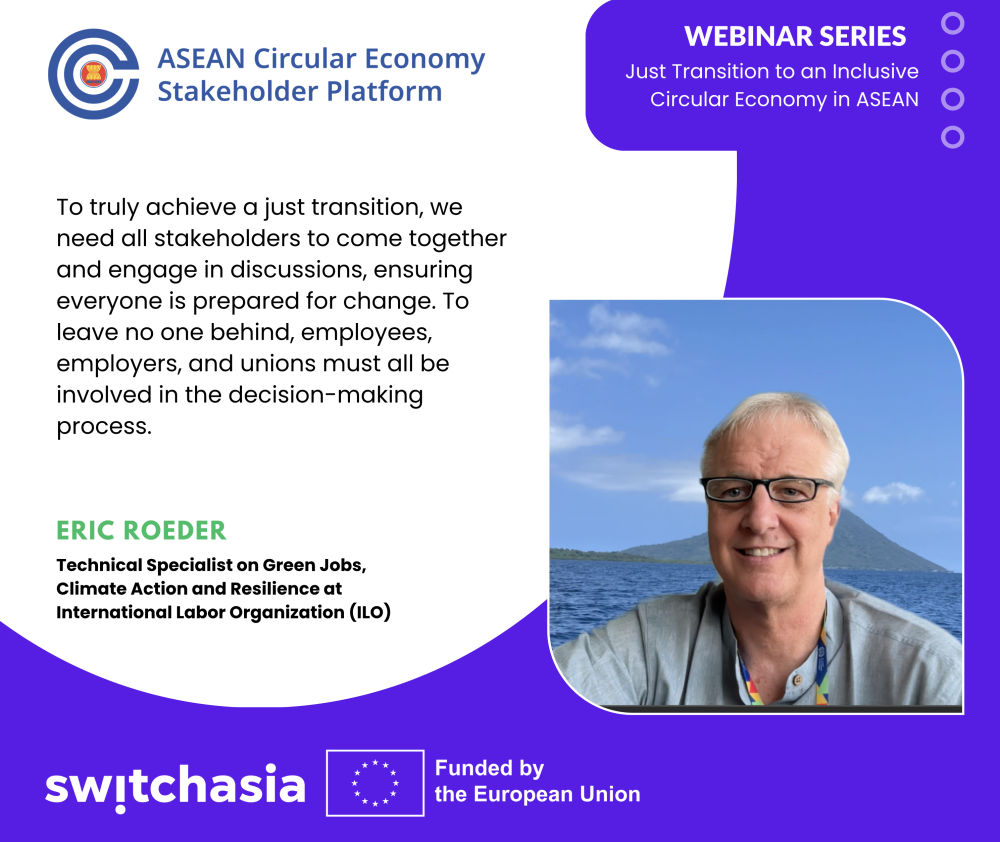 Eric Roeder, Technical Specialist on Green Jobs, Climate Action, and Resilience at the International Labour Organization, presented a Just Transition from an ILO—labour—perspective, highlighting its tripartite nature with three main pillars: job creation, climate action, and social justice. Job creation must support the economy's advancement toward a greener and lower-carbon society. Social justice is the key pillar for ILO’s Just Transition, involving social dialogues or multi-stakeholder participation in policymaking. This means all stakeholders—workers, employers, and the government—should have a seat at the table and have their voices represented in the drafted policy. The three pillars of a Just Transition, as described, should address the problems seen today with non-participatory and top-down policies. For example, in Thailand, the government moved towards organic agriculture in terms of policy, but the farmers were not consulted. In practice, the farmers already received subsidies for industrial-based agricultural inputs, which are fossil fuel-based herbicides, pesticides, fungicides, and fertilizers. Therefore, the farmers were not ready to transition to more sustainable options. A Just Transition from ILO’s perspective aims to leave no one behind by improving environmental quality and resilience, enhancing economies, generating lower emissions and environmental impacts, while increasing jobs and income and minimizing and addressing negative social impacts.
Eric Roeder, Technical Specialist on Green Jobs, Climate Action, and Resilience at the International Labour Organization, presented a Just Transition from an ILO—labour—perspective, highlighting its tripartite nature with three main pillars: job creation, climate action, and social justice. Job creation must support the economy's advancement toward a greener and lower-carbon society. Social justice is the key pillar for ILO’s Just Transition, involving social dialogues or multi-stakeholder participation in policymaking. This means all stakeholders—workers, employers, and the government—should have a seat at the table and have their voices represented in the drafted policy. The three pillars of a Just Transition, as described, should address the problems seen today with non-participatory and top-down policies. For example, in Thailand, the government moved towards organic agriculture in terms of policy, but the farmers were not consulted. In practice, the farmers already received subsidies for industrial-based agricultural inputs, which are fossil fuel-based herbicides, pesticides, fungicides, and fertilizers. Therefore, the farmers were not ready to transition to more sustainable options. A Just Transition from ILO’s perspective aims to leave no one behind by improving environmental quality and resilience, enhancing economies, generating lower emissions and environmental impacts, while increasing jobs and income and minimizing and addressing negative social impacts.
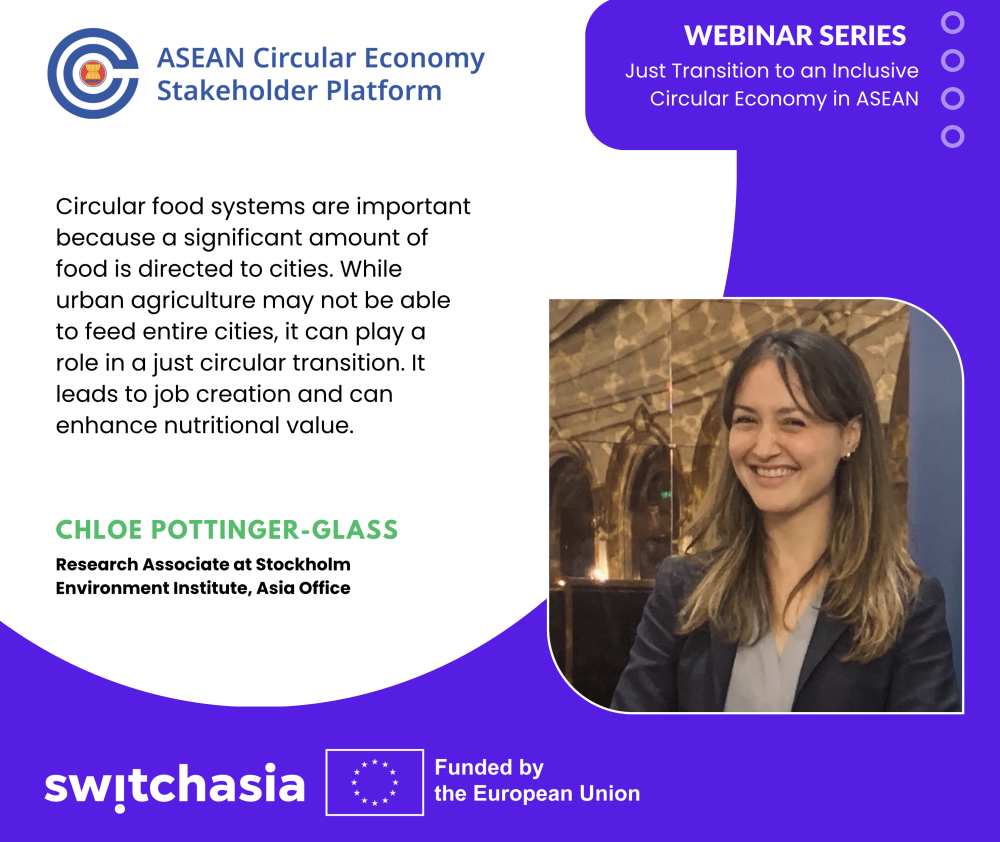 Chloe Pottinger-Glass, Research Associate at the Stockholm Environment Institute (SEI) Asia Office, emphasized the importance of just transitions and inclusive circular economies in cities. Currently, half of the world’s population lives in cities, and this number is expected to increase to two-thirds by 2050. Urban-scale decisions, practices, and behaviours will have major impacts on global carbon emissions. Cities and urban dwellers are also highly vulnerable to the impacts of climate change, especially in Asia, such as outdoor workers and residents of informal settlements who will be most affected. A Just Transition in cities involves addressing which sectors will be affected, what the labour market will look like, and which individuals will be most vulnerable. The informal sector is a key example. In Thailand, the informal sector is estimated to be responsible for up to 75% of all recycling in the country. This figure might also be common across different ASEAN countries. These jobs are incredibly precarious when comparing the pay with hazardous working conditions, and most importantly, they are often excluded from Social Security Systems.
Chloe Pottinger-Glass, Research Associate at the Stockholm Environment Institute (SEI) Asia Office, emphasized the importance of just transitions and inclusive circular economies in cities. Currently, half of the world’s population lives in cities, and this number is expected to increase to two-thirds by 2050. Urban-scale decisions, practices, and behaviours will have major impacts on global carbon emissions. Cities and urban dwellers are also highly vulnerable to the impacts of climate change, especially in Asia, such as outdoor workers and residents of informal settlements who will be most affected. A Just Transition in cities involves addressing which sectors will be affected, what the labour market will look like, and which individuals will be most vulnerable. The informal sector is a key example. In Thailand, the informal sector is estimated to be responsible for up to 75% of all recycling in the country. This figure might also be common across different ASEAN countries. These jobs are incredibly precarious when comparing the pay with hazardous working conditions, and most importantly, they are often excluded from Social Security Systems.
Regarding food systems, circular food systems, particularly in cities, will be very important because the majority of food production is channelled to urban consumers. Urban agricultural schemes in Asian cities are practicing inclusive circular economy models. SEI has been working with the Bangkok Rooftop Farminginitiative, which utilizes unused rooftop spaces above a shopping mall. The mall's food court produces food waste, which is composted to grow vegetables for in-building distribution. The investment was incredibly cheap, at just THB 50,000 per year (about USD 1,500), and was recovered in just three years, becoming profitable. The project is now looking to expand to 19 more locations. This project combines the concept of a circular economy with social entrepreneurship to help cut food loss and waste and create a range of jobs in agriculture, operations, and logistics delivery while increasing the availability of nutritious food at a local scale in a short supply chain.
The most important aspect of a Just Transition is supporting collective action in its various forms, whether through labour unions, associations, cooperatives, and recognizing how important this is for ensuring a just transition to a circular economy. Formalization of the informal waste sector has always had mixed results. In 1993 in Pune, India, informal waste workers banded together and demanded their rights as providers of this essential service and were granted health insurance and official licenses to operate by the municipality. But in Thailand and Vietnam, waste workers themselves are reluctant due to concerns about taxation or regulations on their activities. There might not be a one-size-fits-all solution for every country, but taking what worked well in a particular place and trying to replicate it by adjusting the context according to the culture and social norms to support associations and build up their collective bargaining power might be a fruitful starting point. For example, the Zero Baht Shop works to bring waste workers together to support them in aggregating materials, protecting them from price fluctuations. This means if they collect something and the price drops, they won't have to dump it, leading to other environmental challenges. At the shop, they can also exchange waste for daily essentials, so it’s not just about financial returns. This is an interesting model that could potentially be rolled out in more places.
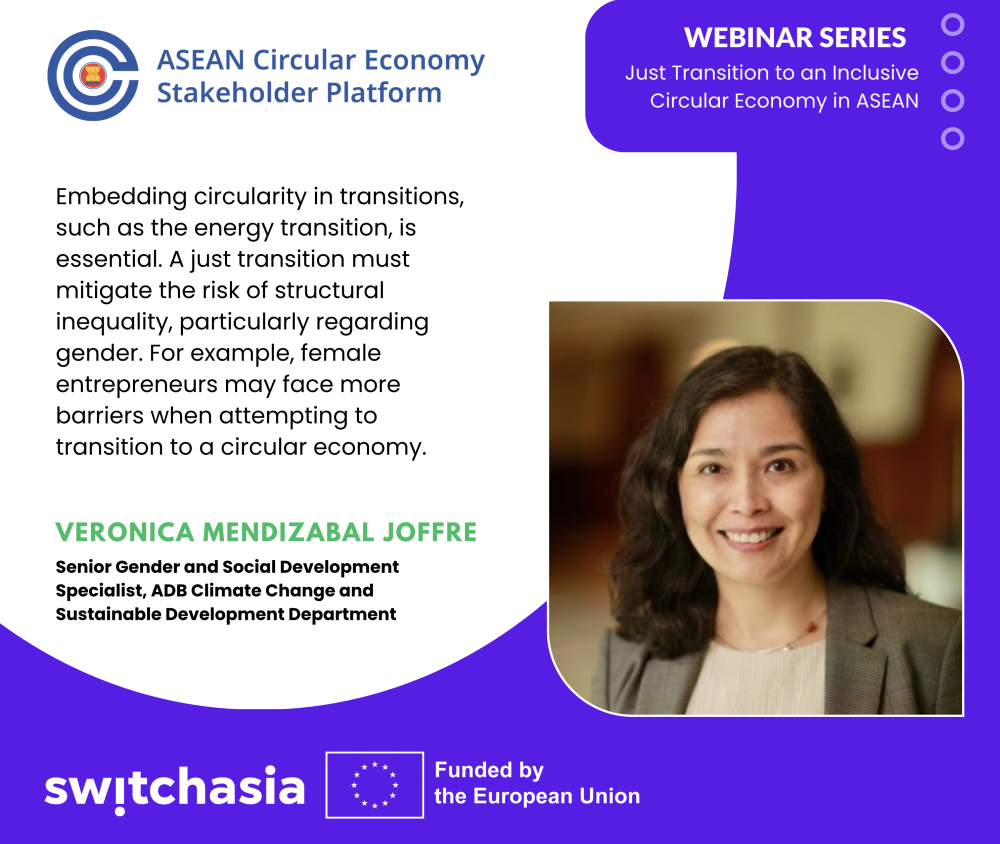 Veronica Mendizabal Joffre, Senior Gender and Social Development Specialist on Climate Change and Sustainable Development at the Asian Development Bank (ADB), shared that ADB is proud to be the climate bank of Asia and the Pacific, pledging USD 100 billion in climate finance by 2030. Significant progress has been made by committing USD 10 billion to climate finance from its own resources last year. Climate finance and action are acknowledged to go hand in hand with social development. Therefore, two of ADB’s strategic corporate priorities are focused on addressing remaining poverty and inequality and accelerating gender equality in the region. The majority of the Just Transition work has focused on energy transition, emphasizing climate mitigation, and the shift toward renewable energy sources and technologies. These transitions will rely on critical minerals and metals extraction, and circularity must be discussed in terms of risk mitigation for extensive resource extraction, as well as recycling, reuse, and ensuring sustainable supplies of these materials. Energy is a critical sector with large implications, particularly in terms of the equitable distribution of costs and benefits or risks and opportunities. Unfortunately, these aspects have not been sufficiently highlighted in the Energy Transition Plans.
Veronica Mendizabal Joffre, Senior Gender and Social Development Specialist on Climate Change and Sustainable Development at the Asian Development Bank (ADB), shared that ADB is proud to be the climate bank of Asia and the Pacific, pledging USD 100 billion in climate finance by 2030. Significant progress has been made by committing USD 10 billion to climate finance from its own resources last year. Climate finance and action are acknowledged to go hand in hand with social development. Therefore, two of ADB’s strategic corporate priorities are focused on addressing remaining poverty and inequality and accelerating gender equality in the region. The majority of the Just Transition work has focused on energy transition, emphasizing climate mitigation, and the shift toward renewable energy sources and technologies. These transitions will rely on critical minerals and metals extraction, and circularity must be discussed in terms of risk mitigation for extensive resource extraction, as well as recycling, reuse, and ensuring sustainable supplies of these materials. Energy is a critical sector with large implications, particularly in terms of the equitable distribution of costs and benefits or risks and opportunities. Unfortunately, these aspects have not been sufficiently highlighted in the Energy Transition Plans.
It is crucial to acknowledge that a Just Transition needs to mitigate the risk of structural inequality, with a specific focus on gender inequality. Understanding that women generally have less ownership and control over resources—whether it be land, property, education, finance, technology, etc.—has significant implications for their participation in and benefits from green transitions and circular economy processes. ADB is currently conducting a study in Cambodia to identify gender barriers that female entrepreneurs from micro, small, and medium-sized enterprises (MSMEs) encounter when transitioning to a green economy. Additionally, the Circular Economy can create new jobs in areas such as waste management, recycling, reuse, repair, refurbishment, new product design, and engineering. This requires deliberate interventions and awareness to leverage women's potential to establish businesses in these sectors, focusing on capacity building and skills development. Many women are already engaged in the Circular Economy, often in the informal sector. In Indonesia, for example, there are approximately 17,000 waste banks, and the majority are managed and run by women. However, as mentioned earlier, informal workers face low wages, lack social protection, and are exposed to health hazards. Formalizing and improving these working conditions can increase the benefits of transitioning to a Circular Economy.
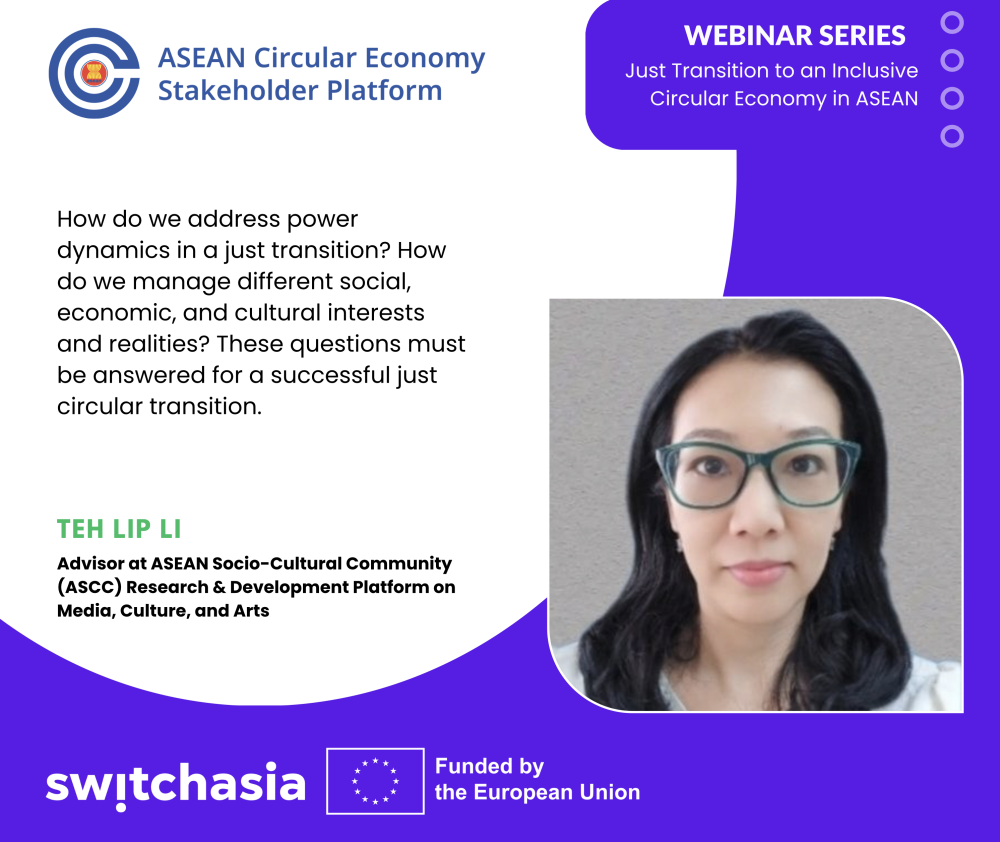 Teh Lip Li, Advisor on the Research & Development Platform on Media, Culture, and Arts at the ASEAN Socio-Cultural Community (ASCC), cautioned that there is an asymmetry in the power dynamics between regions, including different levels of development and priorities. The ASEAN region has many member states with diverse political, economic, social, and cultural interests. When discussing a Just Transition, it is important to be sensitive to these diverse contexts and interact with different stakeholders appropriately based on risks, benefits, and timeframes. A good example is the EU Green Deal, which is a legal, regulatory, policy reform, and financing tool launched by the EU. However, a key question about the EU Green Deal in an Asian context is how it fits within the socio-economic and cultural contexts of different regions. Will a country where the population barely meets the poverty line be able to prioritize the circular economy? These are complex issues that will require more analysis and discussion to move forward.
Teh Lip Li, Advisor on the Research & Development Platform on Media, Culture, and Arts at the ASEAN Socio-Cultural Community (ASCC), cautioned that there is an asymmetry in the power dynamics between regions, including different levels of development and priorities. The ASEAN region has many member states with diverse political, economic, social, and cultural interests. When discussing a Just Transition, it is important to be sensitive to these diverse contexts and interact with different stakeholders appropriately based on risks, benefits, and timeframes. A good example is the EU Green Deal, which is a legal, regulatory, policy reform, and financing tool launched by the EU. However, a key question about the EU Green Deal in an Asian context is how it fits within the socio-economic and cultural contexts of different regions. Will a country where the population barely meets the poverty line be able to prioritize the circular economy? These are complex issues that will require more analysis and discussion to move forward.
Panel Discussion: Balancing Growth and Equity: A Just Transition to the Circular Economy in ASEAN
Anthony Pramualratana moderated the session on the local challenges and practices in each country's context and emphasized the diverse nature of the ASEAN region.
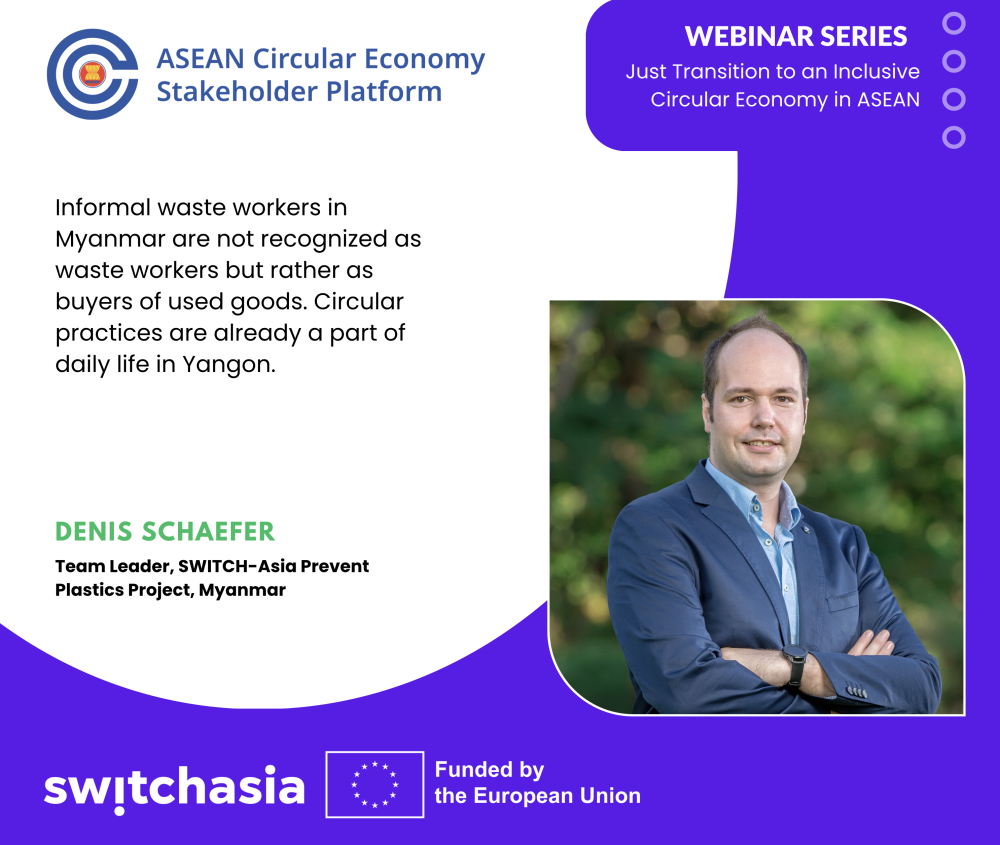 Denis Schaefer, Team Leader for the Prevent Plastics Project in Myanmar, reiterated critical issues regarding the informal sector. In Myanmar, sustainable waste management or the Circular Economic context involves the so-called 'illegal waste pickers.' They are 'illegal' because, in theory, the city development committees have the rights to and own all the waste generated. This means only the waste pickers employed by these governmental departments can manage the waste, making everyone else who tries to manage the waste illegal. In practice, the governmental departments are unable to sustainably manage all the waste generated in the cities, and Myanmar could not function without these 'illegal waste pickers.'
Denis Schaefer, Team Leader for the Prevent Plastics Project in Myanmar, reiterated critical issues regarding the informal sector. In Myanmar, sustainable waste management or the Circular Economic context involves the so-called 'illegal waste pickers.' They are 'illegal' because, in theory, the city development committees have the rights to and own all the waste generated. This means only the waste pickers employed by these governmental departments can manage the waste, making everyone else who tries to manage the waste illegal. In practice, the governmental departments are unable to sustainably manage all the waste generated in the cities, and Myanmar could not function without these 'illegal waste pickers.'
The waste pickers collect waste door-to-door. They buy old items, such as electronics, repair them, and sell them for profit, functioning like a trading company circulating goods in a Circular Economy. They also circulate other wastes by collecting and selling to junk shops or waste aggregators for profits. Myanmar does not have a glass factory, so glass is highly valued and sought after for the retake & reuse scheme. The waste pickers collect bottles and sell them back to factories, which then clean, refill, and resell them to the market. This is a fully circular economy model, which was common in most countries in the past. The International Alliance of Waste Pickers proposes banning all plastics, confident that they can handle the retake & reuse systems.
The Prevent Plastics Project, funded by the EU SWITCH-Asia programme, is working to create cooperatives with 10 waste pickers with government funding and assist them to work freely but together, not against each other. This harmonization can maximize waste collection and profits collectively and individually. The project offers basic training on how to safely handle waste, which waste to avoid or handle with safety equipment, and how to do so. Education on finance management is also provided. A just transition should always ensure that existing workers, whether formal or informal, do not lose their jobs and sources of income.
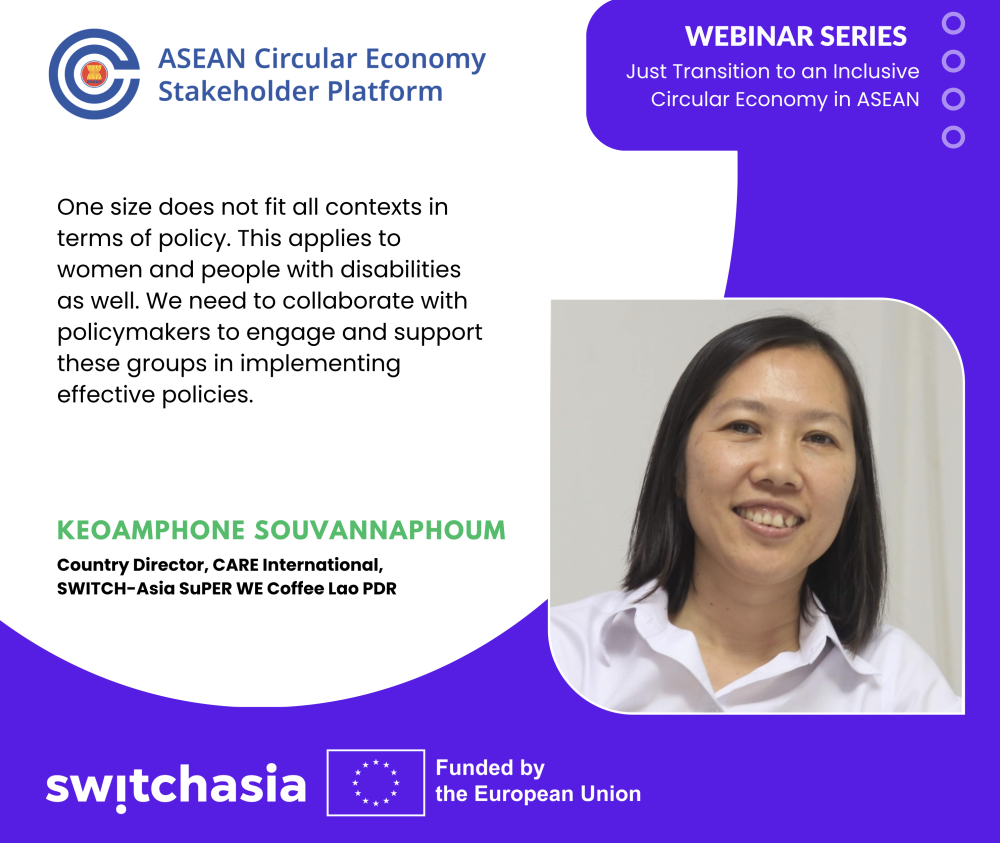 Keoamphone Souvannaphoum, Country Director for CARE International in Lao PDR, gave a background on CARE’s work. CARE focuses on poverty reduction with a strong emphasis on social justice. A current project funded by the EU SWITCH-Asia programme, Sustainable Production and Ethic Responsible & Women Empowered Coffee Value Chains in Lao PDR: SuPER WE Coffee, works with 400 farmers and has over 4,000 beneficiaries. Women’s roles in this project involve inclusive participation and opportunities. The project works with female coffee farmers, most of whom are from ethnic groups. Addressing social norms and decision-making power at the household level regarding delegating responsibility, CARE has three approaches: individual agency, social relations, and institutional structure. When involving the production cycle, engaging and participating women at all stages is crucial. This is the core value of the project. It starts with awareness and capacity building around the activities they are involved in, how it will benefit them, and what kind of skills development is required for women to be fully a part of the supply chain.
Keoamphone Souvannaphoum, Country Director for CARE International in Lao PDR, gave a background on CARE’s work. CARE focuses on poverty reduction with a strong emphasis on social justice. A current project funded by the EU SWITCH-Asia programme, Sustainable Production and Ethic Responsible & Women Empowered Coffee Value Chains in Lao PDR: SuPER WE Coffee, works with 400 farmers and has over 4,000 beneficiaries. Women’s roles in this project involve inclusive participation and opportunities. The project works with female coffee farmers, most of whom are from ethnic groups. Addressing social norms and decision-making power at the household level regarding delegating responsibility, CARE has three approaches: individual agency, social relations, and institutional structure. When involving the production cycle, engaging and participating women at all stages is crucial. This is the core value of the project. It starts with awareness and capacity building around the activities they are involved in, how it will benefit them, and what kind of skills development is required for women to be fully a part of the supply chain.
Circular Economy in coffee processing involves recycling water and turning coffee scraps into fertilizer and biochar. The social aspect is to empower women. Too many women cannot read, cannot understand the context, and therefore do not have the decision-making power to participate in discussions at the cooperative level. The project works with women to ensure they have the knowledge, understanding, techniques, skills, and negotiation power to meaningfully participate throughout the entire supply chain, from production, processing, distribution, and marketing to disposal. Policy reform requires significant efforts to enable the project's effectiveness in empowering women to reach their goals. Influencing the institutional level can bring about policy changes. Gender equality seems like a small cross-cutting area, but significant work must be done at the grassroots level by multi-stakeholder collaboration.
Returning to basics, it all starts with rights realization. Many social norms and prohibitive factors lead to a lack of knowledge, awareness, and understanding due to limited educational opportunities. We work with women to understand their rights, leading to more awareness, understanding, skills, and negotiation power to advocate for their participation. This is women’s economic justice, empowering them to raise their families and contribute to their communities. In terms of policy, there is no one-size-fits-all, especially regarding gender differences, including LGBTQIA+ people and the disabled. When discussing policy, it is always associated with enforcement, and interpretations vary, but what if we see policy as a pathway of collaboration and work with policymakers to ensure the policy is practical and supportive of the people? ASEAN countries have different contexts, but there is much to learn from each other regarding policy and practices. There is a lot of opportunity for cross-sharing and learning, and we can benefit from being part of this diverse region.
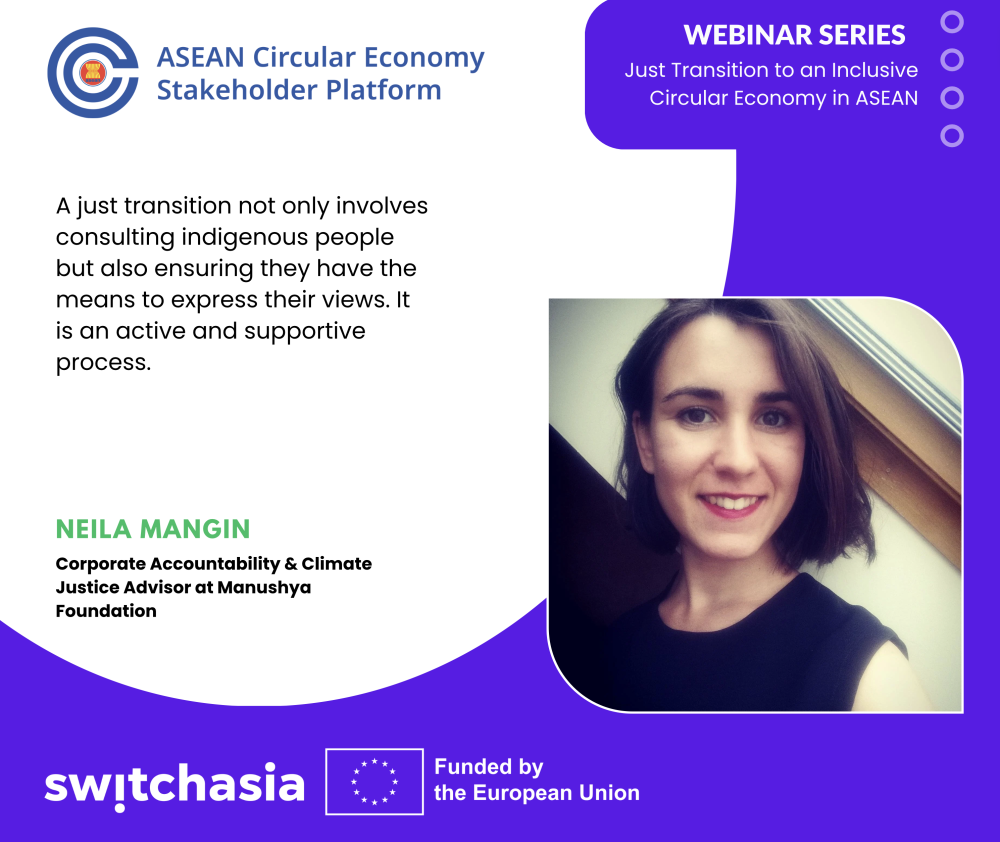 Neila Mangin, Corporate Accountability & Climate Justice Advisor at Manushya Foundation, echoed the importance of distributive justice, procedural justice, and recognition of rights. Including the rights of local communities and indigenous peoples in the conversation is crucial. There are an estimated 300 million indigenous people worldwide, with two-thirds in Asia and half in Southeast Asia alone. They are at the forefront of facing the impacts of climate change and circular transitions, such as energy transitions. Some countries may be better than others in protecting them, but overall, they are still not properly recognized and are missing from the conversation and decision-making table. In Thailand, for example, indigenous people are not yet recognized and have no title or nationality. A new legislation is being drafted, but it is not yet passed into law. It is crucial for this legislation to be adopted so indigenous people can be recognized as citizens of a nation and have basic human and citizen rights.
Neila Mangin, Corporate Accountability & Climate Justice Advisor at Manushya Foundation, echoed the importance of distributive justice, procedural justice, and recognition of rights. Including the rights of local communities and indigenous peoples in the conversation is crucial. There are an estimated 300 million indigenous people worldwide, with two-thirds in Asia and half in Southeast Asia alone. They are at the forefront of facing the impacts of climate change and circular transitions, such as energy transitions. Some countries may be better than others in protecting them, but overall, they are still not properly recognized and are missing from the conversation and decision-making table. In Thailand, for example, indigenous people are not yet recognized and have no title or nationality. A new legislation is being drafted, but it is not yet passed into law. It is crucial for this legislation to be adopted so indigenous people can be recognized as citizens of a nation and have basic human and citizen rights.
In agriculture, indigenous and traditional farming methods have effectively mitigated climate change while providing communities with their livelihoods. Therefore, involving indigenous communities and people on the ground in discussions and decision-making is important. However, it can be hard for them to leave their farms to attend meetings, so simple supports such as compensation, stipends, or per diems for attending meetings can greatly help increase participation rates. These small details can become big principles of effective inclusive participation and help make them a reality.
- Video recording available here
- Event info at ASEAN Circular Economy Stakeholder Platform and EU SWITCH-Asia
Acknowledgment
This Knowledge Brief was prepared by Dr. Sirasa Kantaratakul, the EU SWITCH-Asia Policy Support Component (PSC) and the ASEAN Circular Economy Stakeholder Platform. The information and contents in this document are the sole responsibility of the authors and do not necessarily reflect the views of the European Union.
[1] https://www.un.org/development/desa/dpad/wp-content/uploads/sites/45/CDP-excerpt-2023-1.pdf
[2] https://www.ilo.org/empent/areas/social-finance/WCMS_825124/lang--en/index.htm



